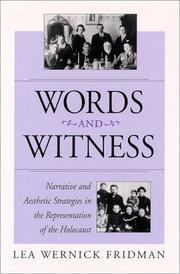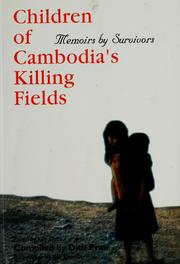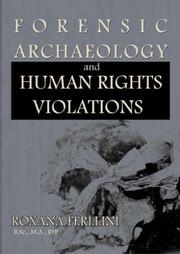| Listing 1 - 10 of 62 | << page >> |
Sort by
|

ISBN: 0791492443 9780791492444 9780791446102 0791446107 0791446093 0791446107 9780791446096 Year: 2000 Publisher: Albany State University of New York Press
Abstract | Keywords | Export | Availability | Bookmark
 Loading...
Loading...Choose an application
- Reference Manager
- EndNote
- RefWorks (Direct export to RefWorks)
Connects Holocaust literature and film to other works of "historical horror" in order to examine the limits that trauma imposes upon literary and artistic expression.
Holocaust, Jewish (1939-1945), in literature. --- Jews --- Persecutions. --- Antisemitism --- Persecution --- Political atrocities
Book
ISBN: 0253008905 9780253008909 1299620116 9781299620117 9780253008787 0253008786 Year: 2013 Publisher: Bloomington, Indiana
Abstract | Keywords | Export | Availability | Bookmark
 Loading...
Loading...Choose an application
- Reference Manager
- EndNote
- RefWorks (Direct export to RefWorks)
Dating back millennia, antisemitism has been called ""the longest hatred."" Thought to be vanquished after the horrors of the Holocaust, in recent decades it has once again become a disturbing presence in many parts of the world. Resurgent Antisemitism presents original research that elucidates the social, intellectual, and ideological roots of the ""new"" antisemitism and the place it has come to occupy in the public sphere. By exploring the sources, goals, and consequences of today's antisemitism and its relationship to the past, the book contributes to an understanding of this phenomenon
Antisemitism --- Anti-Jewish attitudes --- Anti-Semitism --- Ethnic relations --- Prejudices --- Philosemitism --- History --- Jews --- Persecutions. --- Persecution --- Political atrocities
Book
ISBN: 0522877613 9780522877618 0522877605 9780522877601 Year: 2021 Publisher: Carlton, Victoria
Abstract | Keywords | Export | Availability | Bookmark
 Loading...
Loading...Choose an application
- Reference Manager
- EndNote
- RefWorks (Direct export to RefWorks)
"The Indonesian invasion of East Timor in 1975 led to a prolonged conflict, severe human rights abuses and a large loss of life. From 1975 to 1983 the Indonesian military's campaign of 'encirclement and annihilation' destroyed rural food resources, creating the famine that took most of the lives lost during the occupation. The Australian governments of Gough Whitlam and Malcolm Fraser presented themselves as advocates for human rights and the international rule of law, while viewing relations with Indonesia as key to their foreign policy objectives. These positions came into conflict due to the Indonesian invasion of East Timor Based upon an extensive study of Australian foreign affairs archives, as well as interviews, A Narrative of Denial demonstrates how the Australian government responded to the conflict by propagating a version of events that denied the reality of the catastrophe occurring in East Timor."--Publisher's description.
Autonomy and independence movements. --- Political atrocities. --- Australia --- Indonesia --- Timor-Leste --- Foreign relations

ISBN: 9786611722937 1281722936 0300133839 0585347603 9780585347608 9780300133837 0300068395 0300078730 9780300068399 6611722939 9781281722935 Year: 1997 Publisher: New Haven, Conn. Yale University Press
Abstract | Keywords | Export | Availability | Bookmark
 Loading...
Loading...Choose an application
- Reference Manager
- EndNote
- RefWorks (Direct export to RefWorks)
This extraordinary book contains eyewitness accounts of life in Cambodia during Pol Pot's genocidal Khmer Rouge regime from 1975 to 1979, accounts written by survivors who were children at the time. The book has been put together by Dith Pran, whose own experiences in Cambodia were so graphically portrayed in the film The Killing Fields.The testimonies related here bear poignant witness to the slaughter the Khmer Rouge inflicted on the Cambodian people. The contributors-most of them now in the United States and pictured in photographs that accompany their stories-report on life in Democratic Kampuchea as seen through children's eyes. They speak of their bewilderment and pain as Khmer Rouge cadres tore their families apart, subjected them to harsh brainwashing, drove them from their homes to work in forced-labor camps, and executed captives in front of them. Their stories tell of suffering and the loss of innocence, the struggle to survive against all odds, and the ultimate triumph of the human spirit.
Political atrocities --- Children --- Childhood --- Kids (Children) --- Pedology (Child study) --- Youngsters --- Age groups --- Families --- Life cycle, Human --- Cambodia --- History --- S32/0200 --- Central Asia--Central Asia: general works --- Political atrocities -- Cambodia.. --- Children -- Cambodia -- Biography.. --- Cambodia -- History -- 1975-1979.

ISBN: 9401201846 1423787579 9781423787570 9042017481 9789042017481 9789401201841 Year: 2006 Publisher: Amsterdam New York Rodopi
Abstract | Keywords | Export | Availability | Bookmark
 Loading...
Loading...Choose an application
- Reference Manager
- EndNote
- RefWorks (Direct export to RefWorks)
The topic of "evil" means different things depending upon context. For some, it is an archaic term, while others view it as a central problem of ethics, psychology, or politics. Coupled with state power, the problem of evil takes on a special salience for most observers. When governments do evil -in whatever way we define the term - the scale of harm increases, sometimes exponentially. The evils of state violence, then, demand our attention and concern. Yet the linkage of evil with state power does not resolve the underlying question of how to understand the concepts that we invoke when we use the term. Instead, the question becomes what evil means in the context of and in relation to state power. The fifteen essays in this book bring multiple perspectives to bear on the problems of state-sponsored evil and violence, and on the ways in which law enables or responds to them. The approaches and conclusions articulated by the various contributors sometimes complement and sometimes stand in tension with each other, but as a whole they contribute to our ongoing effort to understand the characteristics and workings of state power, and our need to grapple with the harm it causes.
Political atrocities --- Political violence --- State-sponsored terrorism --- Government violence --- Governmental violence --- State-sponsored violence --- State terrorism --- Violence, Governmental --- Violence, State-sponsored --- Terrorism --- Violence --- Political crimes and offenses --- Atrocities --- Government policy --- State-sponsored terrorism. --- Political atrocities. --- Government policy.
Book
ISBN: 9004411240 9789004411241 9789004411234 Year: 2020 Publisher: Leiden Boston
Abstract | Keywords | Export | Availability | Bookmark
 Loading...
Loading...Choose an application
- Reference Manager
- EndNote
- RefWorks (Direct export to RefWorks)
In The Roles and Functions of Atrocity-Related United Nations Commissions of Inquiry in the International Legal Order, Catherine Harwood explores the turn to international law in atrocity-related United Nations commissions of inquiry and their navigation of considerations of principle (the legal) and pragmatism (the political), to discern their identity in the international legal order. The book traces the inquiry process from establishment and interpretation of the mandate to legal analysis, production of findings and recommendations. The research finds that the turn to international law fundamentally shapes the roles and functions of UN atrocity inquiries. Inquiries continuously navigate between realms of law and politics, with the equilibrium shifting in different moments and contexts.

ISBN: 0398085196 9780398085193 9780398077341 0398077347 9780398077358 0398077355 Year: 2007 Publisher: Springfield Charles C Thomas Publisher, LTD
Abstract | Keywords | Export | Availability | Bookmark
 Loading...
Loading...Choose an application
- Reference Manager
- EndNote
- RefWorks (Direct export to RefWorks)
Forensic archaeology has become a paramount tool with regard to the investigation of human rights abuses in recent times, by utilizing field techniques that provide a scientific means of searching, locating and recovering the victims of human rights abuses. By applying such techniques, human remains may be positively identified, thereby assisting survivors who are then able to lay their dead to rest and begin a process of closure after such tragic events have occurred. Additionally, the circumstances of the victim's demise will be accurately recorded, and in course this information will be dul
Forensic anthropology. --- Forensic sciences. --- Human remains (Archaeology) --- Human rights. --- Crimes against humanity. --- Political atrocities. --- Crime scenes. --- Criminal investigation. --- Medical jurisprudence.

ISBN: 1282861611 9786612861611 0773571604 9780773571600 0773526412 9780773526419 0773526420 9780773526426 Year: 2003 Publisher: Montreal [Que.] McGill-Queen's University Press
Abstract | Keywords | Export | Availability | Bookmark
 Loading...
Loading...Choose an application
- Reference Manager
- EndNote
- RefWorks (Direct export to RefWorks)
Marchak departs significantly from mainstream explanations of genocide, rejecting racism as a fundamental cause and disputing a wide range of other explanations that cite racist and religious ideologies, perception of threat, authoritarianism, and unique historical circumstances as primary causes. She argues that while these variables may be contributing factors, states move toward human rights crimes because their governments can no longer sustain a particular social hierarchy. Reasons for their paralysis may be economic, environmental, demographic, or purely political. In an attempt to re-establish the former status quo, they turn against groups low on the hierarchical scale, some of which may be defined in ethnic terms. If governments come into power as revolutionary forces, they may commit such crimes in order to establish a new social hierarchy. Other necessary but insufficient conditions for state crimes include the military capacity for committing mass murder, the creation of ideology that justifies such action, and the failure of independent institutions such as the mass media and universities to counter ideological and military forces. Reigns of Terror is highly accessible and aimed at an audience of senior undergraduates, graduate students, and faculty in the social sciences, as well as a more general reading public concerned about the many state-sponsored crimes against humanity still occurring in the world.
Crimes against humanity. --- Genocide --- Political atrocities --- Atrocities --- Cleansing, Ethnic --- Ethnic cleansing --- Ethnic purification --- Ethnocide --- Purification, Ethnic --- Crime --- Sociology of genocide --- Sociology --- International crimes --- War crimes --- Sociological aspects. --- History
Book
ISBN: 1280688173 9786613665119 9004225692 9789004225695 9789004224568 9781280688171 6613665118 9004224564 Year: 2012 Publisher: Leiden BRILL
Abstract | Keywords | Export | Availability | Bookmark
 Loading...
Loading...Choose an application
- Reference Manager
- EndNote
- RefWorks (Direct export to RefWorks)
Terrorism, a widespread global phenomenon, manifests itself in the actions and the policies of individuals and groups, but also and primarily in the actions and policies of states. Delving into the seldom-discussed question of the motivation for most episodes of terrorism, this book studies terrorism’s effects based on the economic and geopolitical imbalances that frame today's global governance. The main goal of terrorism is to induce terror, and perhaps to influence public opinion for political change. Many states hide their terrorist activities under the “faces” they show the world, masks intended to hide real aims of acquiring or expanding power and wealth. These activities, presented as “self-defense,” “preventive action,” “counter-measures” or even as promoting 'progress and development,' are forms of state terrorism that are much more widespread, powerful, and destructive than the actions originating from groups labeled terrorist since 9/11. This book examines the numerous illegal measures states use, from unlawful imprisonment and curtailing of civil liberties to torture, in the name of responding to terrorism. At the same time, it considers how trade and industrial activities terrorize people by depriving them of the natural resources they need to survive and by exposing communities to life-threatening hazardous conditions. In closing, the book considers how existing laws might stem the tide of state terrorism. The conclusions are not optimistic: the UN's systems and legal regimes are clear in defense of human rights, but the structure and nature of state power do not permit these mandates to prevail. With a foreword by Tullio Scovazzi.
State-sponsored terrorism. --- Terrorism --- Government violence --- Governmental violence --- State-sponsored violence --- State terrorism --- Violence, Governmental --- Violence, State-sponsored --- Political atrocities --- Political aspects. --- Economic aspects.

ISBN: 1134195699 1280400153 9786610400157 0203099826 9780203099827 041537152X 9781134195695 9781280400155 6610400156 9781134195640 9781134195688 9780415371520 9780415470278 1134195680 Year: 2006 Publisher: London ; New York : Routledge,
Abstract | Keywords | Export | Availability | Bookmark
 Loading...
Loading...Choose an application
- Reference Manager
- EndNote
- RefWorks (Direct export to RefWorks)
Investigating the political consequences of the mass killings in Indonesia in 1965 to 1966 upon public life, the author highlights the historical specificities of the violence and comparable incidents of identity politics.
Political atrocities --- State-sponsored terrorism --- Government violence --- Governmental violence --- State-sponsored violence --- State terrorism --- Violence, Governmental --- Violence, State-sponsored --- Terrorism --- Atrocities --- Indonesia --- Politics and government
| Listing 1 - 10 of 62 | << page >> |
Sort by
|

 Search
Search Feedback
Feedback About UniCat
About UniCat  Help
Help News
News